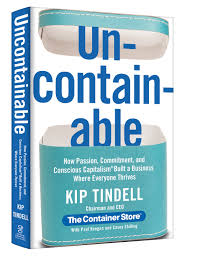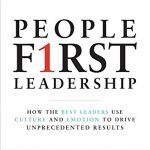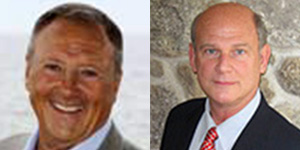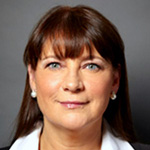Check out this Uncontainable book review!
– the book: Uncontainable: How Passion, Commitment, and Conscious Capitalism Built a Business Where Everyone Thrives, the story of The Container Store told by its co-founder and Chairman Kip Tindell
– the brains: Kip Tindell never intended to go into business, but from an early age he loved retail, he was involved with philosophy, and he was always organizing things (fly fishing tackle, his coin collection, boxes in the stock room of the shop he worked at, etc.). These three passions came together when his friend and mentor Garrett Boone suggested they open a store together and they decided it would sell “the resources for people to organize all the stuff in their lives.” The file folder he had filled with “great ideas and inspiring quotes” ever since he was a teenager evolved into the seven the Foundation Principles that guide everything the organization does.
– the best bits: Uncontainable weaves together key moments in the history of The Container Store with expositions on its Foundation Principles. This approach effectively illustrates how the Principles have played a key role in how the company operates. Here are just a few examples:
- Principle: Air of Excitement!
Kip says that he thinks of retail as theater and, as such, it’s crucial that the company’s “stage” is set up perfectly. “That’s why we take such great care with our interior design and the presentation of products—to make sure the look and feel of our stores reflect The Container Store’s mission… Our goal is ‘perfect product presentation,’ which means that the customer can clearly understand everything about the product immediately, even if our sales staff is busy helping other customers.“
To engage employees in Air of Excitement, the company holds all sorts of events and celebrations, including “We Love Our Employees Day, held every Valentine’s Day.” Kip justifies the attention paid and resources spent on these activities, saying, “What conventional business minds don’t understand is that all the positive feeling this activity generates is really the fuel that drives our company.“
- Principle: Communication IS Leadership
“Communication and leadership really are the same thing,” according to Kip. “After all, how can people trust their leaders if they’re not being fully informed about what’s at stake?“
So, at The Container Store, the leadership doesn’t operate on a “need to know” basis. Rather, he says, “We ask ourselves, ‘Who will benefit from having this information?‘” And the company gives its employees scheduled time to read, watch, or listen to whatever information is currently available. Devoting labor hours to communication is practically unheard of in retail, especially in this era of skyrocketing labor costs — but The Container Store does it because “it’s really consistent with our belief in valuing one another, making sure we all feel appreciated, included, and empowered, and have the training necessary to be successful in our jobs.“
- Principle: Fill the Other Guy’s Basket to the Brim. Making Money Then Becomes an Easy Proposition.
The Container Store works on “creatively crafting mutually beneficial relationships with our vendors to help them produce and provide the kind of useful, fun, well-designed, high-quality products that delight our customers.” The company, Kip explains, helps its vendors develop new products, places orders during slow periods, pays them on time, and is deeply loyal to them. Vendors, in turn, give The Container Store great pricing, exclusive product, and their loyalty too.
The principle proved its value in one particular instance: The company was able to purchase Elfa, the modular shelving company, despite not being the highest bidder. The long history of a fantastic relationship between the two entities sealed the deal. Kip writes, “At some point, it became clear to elfa’s owners that selling to anyone beside The Container Store would not only mean losing their best customer, but also that the hearts and souls of most of elfa’s management team and employees were with us.“
– the bottom line: Uncontainable is equally inspiring and instructive. It delivers insights and important instruction that should be learned by any business leader who wants to run a business that creates value for all its stakeholders. Highly recommend!
related:
The post brand book bites from Uncontainable appeared first on Denise Lee Yohn.


















